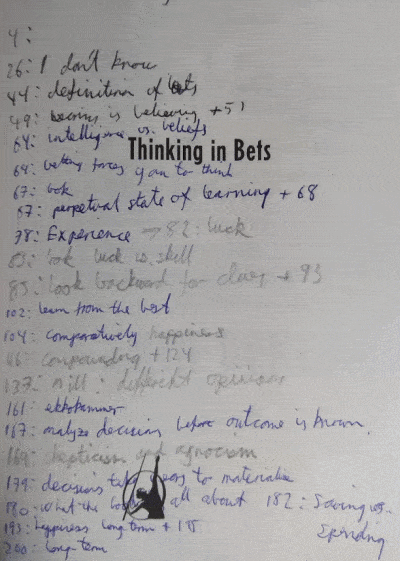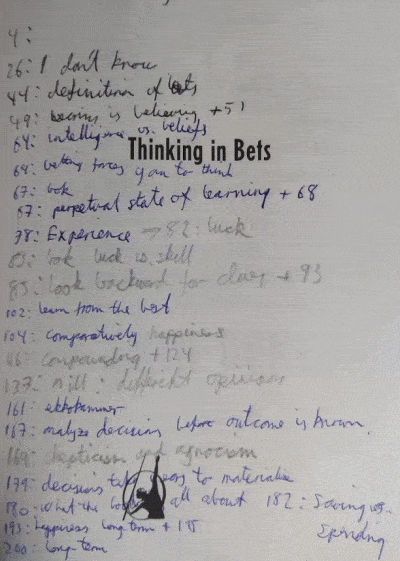
I like to take notes when I read (see my notes on the pic to the left, excuse my eight-year old handwriting). I believe notes are a wonderful resource to revert to later, an even better is having the quotes easy accessible online for later use.
Thinking In Bets by Annie Duke is a fantastic book on how to make better decisions. Decisions is of course what every investor or trader do all the time, often with financial consequences, so I believe this is a worthwhile topic to improve upon. Charlie Munger praised the book, and I understand why.
My takeaway from Thinking In Bets can be summarized in two sentences:
Be agnostic, adaptive, open, truthful to yourself and a student for life. This should compound both knowledge and wealth.
Below you find what I consider the most valuable quotations from the book:
Mistakes, emotions, losing – those things are all inevitable because we are human. The approach of thinking in bets moved me toward objectivity, accuracy, and open-mindedness. That movement compounds over time to create significant changes in our lives.
—————————————————————–
We are discouraged from saying “I don’t know” or “I’m not sure”. We regard those expressions as vague, unhelpful, and even evasive. But getting comfortable with “I’m not sure” is a vital step to being a better decision-maker. We have to make peace with not knowing.
—————————————————————–
What makes a great decision is not that it has a great outcome. A great decision is the result of a good process, and that process must include an attempt to accurately represent our own state of knowledge. That state of knowledge, in turn, is some variation of “I’m not sure”.
—————————————————————–
In fact, believing is so easy, and perhaps so inevitable, that it may be more like involuntary comprehension than it is like rational assessment.
—————————————————————–
It turns out the better you are with numbers, the better you are at spinning those numbers to conform to and support your beliefs.
—————————————————————–
“Wanna bet”? Suddenly, you are not so sure. That challenge puts you on your heels, causing you to back opp your declaration and question the belief that you just declared with such assurance.
—————————————————————–
We are in a perpetual state of learning, and that can make any prior fact obsolete.
—————————————————————–

Thinking In Bets by Annie Duke
Given that even scientific facts can have an expiration date, we would all be well-advised to take a good hard look at our beliefs, which are formed and updated in a much more haphazard way than those in science.
—————————————————————–
Experience can be an effective teacher. But, clearly, only some students listen to their teachers. The people who learn from experience improve, advance….
—————————————————————–
Experience is not what happens to a man; it is what a man does with what happens to him.
—————————————————————–
Why did something happen the way it did?
—————————————————————–
And the first step to doing well is recognizing that things sometimes happen because of the other form of uncertainty: luck.
—————————————————————–
Just as we are almost never 100% wrong or right, outcomes are almost never 100% due to luck or skill.
—————————————————————–
Self-serving bias is a deeply embedded and robust thinking pattern. Understanding why this pattern emerges is the first step to developing practical strategies to improve our ability to learn from experience.
—————————————————————–
My biased assessment of why they were winning slowed my learning down considerably. I missed out on a lot of opportunities to make money because I dismissed other players as lucky when I might have been learning from watching them.
—————————————————————–
Luckily, habits can be changed, whether the habit is biting your nails or decrying your terrible luck when you lose.
—————————————————————–
The prospect of a bet makes us examine and refine our beliefs, in this case the belief about whether luck or skill was the main influence in the way things turned out. Betting on what we believe makes us take a closer look by making explicit what is already implicit: we have a great deal at risk in assessing why anything turned out the way it did. That sure sounds like a bet worth taking seriously.
—————————————————————–
The benefits of recognizing just a few extra learning opportunities compound over time…..If the ship’s navigator introduces a one-degree navigation error, it would start off as barely noticeable. Unchecked, however, the ship would veer farther and farther off course and would miss London by miles, as that one-degree miscalculation compounds mile over mile.
—————————————————————–
Having the help of others provides many decision-making benefits, but one of the most obvious is that other people can spot our errors better than we can.
—————————————————————–
Diversity and dissent are not the only checks on fallibility, but the only means of testing the ultimate truth of an opinion.
—————————————————————–
If we’re going to improve our beliefs, we’ll be better off if we include people and information sources we’re likely to disagree with.
—————————————————————–
The best way to do this is to deconstruct decisions before an outcome is known.
—————————————————————–
Yet true skepticism is consistent with good manners, civil discourse, and friendly communications….Skepticism is about approaching the world by asking why things might not be true rather than why they are true….And we need to be particularly skeptical of information that agrees with us because we know that we are biased to just accept and applaud conforming evidence….Don’t say: “You are wrong”! Say, “are you sure about that?”…Organized skepticism invites people into a cooperative exploration.
—————————————————————–
Improving decision quality is about increasing our chances of good outcomes, not guaranteeing them. Even when that effort makes a small difference – more rational thinking and fewer emotional decisions, translated into an increased probability of better outcomes – it can have a significant impact on how our lives turn out. Good results compound.
—————————————————————–
When we make in-the-moment decisions (and don’t ponder the past or future), we are more likely to be irrational and impulsive.
—————————————————————–
Saving for retirement is a temporal discounting problem: the gratification of spending discretionary income is immediate. Putting it away for retirement means we have to wait decades to get enjoyment from that money….Subsequent studies have shown that the ability to delay gratification is correlated with markers of success throughout adolescence and into adulthood.
—————————————————————–
The way we field outcomes is path dependant. It doesn’t so much matter where we end up as how we got there. What has happened in the recent past drives our emotional response much more than how we are doing overall.
—————————————————————–
In relationships, even small disagreements seem big in the midst of the disagreement. The problem in all these situations (and countless others) is that our in-the-moment emotions affect the quality of the decisions we make in those moments, and we are very willing to make decisions when we are not emotionally fit to do so.
—————————————————————–
Anticipating the range of outcomes also keeps us from unproductive regret (or undeserved euphoria) when a particular future happens. Finally, by mapping out the potential futures and probabilities, we are less likely to fall prey to resulting or hindsight bias.
—————————————————————–
Backcasting (looking back from a possible end result) reveals the positive space. Premortems reveal the negative space.
—————————————————————–
Oettingen recognized that we need to have positive goals, but we are more likely to execute on those goals if we think about the negative futures.
—————————————————————–
We form beliefs in a haphazard way, believing all sorts of things based just on what we hear out in the world but haven’t researched ourselves… Gilbert and colleagues demonstrated through a series of experiments that our default is to believe that what we hear and read is true. Even when that information is clearly presented as being false, we are still likely to process it as true.
—————————————————————–
Truthseeking, the desire to know the truth regardless of whether the truth aligns with the beliefs we currently hold, is not naturally supported by the way we process information.

